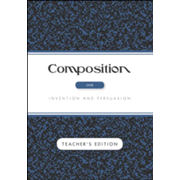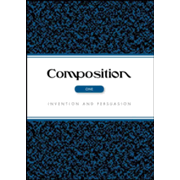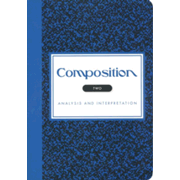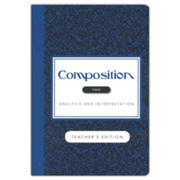A team of writers from Veritas Press worked with professional journalists at God’s World News and WORLD Magazine to create Composition One: Invention and Persuasion and Composition Two: Analysis and Interpretation. Each of these courses should take one school year to complete. The courses are recommended for grades seven through twelve. Composition Two builds upon skills taught in the first course, so all students should begin with Composition One.
Based on classical methodology to some extent, the authors of these courses use both past and present-day writing models that should be very interesting to students. In addition, the input of working journalists on some of the lesson material helps explain why so much of the content seems very pertinent to real-life issues. In addition, many assignments have students search for their own examples or models. This is why the You Teach Kits for these courses include a subscription to WORLD magazine to use as source material for many assignments.
If you are at all familiar with WORLD magazine or God’s World News, you are probably aware that both are published from a Christian worldview. That same worldview carries over into these composition courses. The courses assume that their audience shares their worldview, although they aren't doctrinaire in their approach. For example, in a lesson in Composition One about writing that challenges errors in thinking, it says that this should be done with kindness rather than to crush an opponent. It then lists four authors who “took up their pens to save others from error-filled thinking and saved lives as a result.” The four listed are Saint Paul, Martin Luther, William Wilberforce, and Dietrich Bonhoeffer (pp. 135-136). These writers are all well known primarily because their writing reflected a Christian worldview.
The courses are intensely practical and not at all formulaic. While they discuss the conventions of good writing, they stress the fact that professional writers do not always follow the rules that students have learned. For example, on page 50 in the textbook for Composition One it says, “For most of the writing we will be doing, paragraphs should be around four to seven sentences. This is just a general guideline, not a rule. The only real rule for paragraph length is that a paragraph should be as long as it needs to be to get the job done.”
The teacher's editions both have two suggested schedules at the back of the book. One schedule is for class sessions meeting twice a week, and the other is for classes meeting five days a week. The schedules show what is to be taught in each class session and what is assigned for work between sessions. Obviously, this assumes that students are meeting in class groups. Even so, the courses can be used by students working independently as long as a parent or teacher provides frequent feedback and discussion as needed.
The essential items for both courses are the student edition and the teacher's edition. The teacher's editions have some reduced images of student pages with teaching notes around those images. If there are no teaching notes, student pages are reproduced at full size. The reduced student pages might be hard for some people to read. Christian Book Distributors has sample pages from the Composition One: Teacher's Edition that you can view if you want to check this out in advance.
The teacher's editions have a few pages of introductory material for each of the units, the aforementioned schedules, grading rubrics, and a list of materials (e.g., magazines, family photos, and sticky notes). The courses are self-explanatory for the most part and don’t require very much teaching. They should be manageable for inexperienced homeschooling parents to teach. The biggest challenge will be accurately evaluating student work. The grading rubrics are helpful, but having more than one student’s work for comparison (as in a group class) would make it easier for teachers to evaluate assignments.
You Teach Kits for both courses include the student and teacher's editions plus a WORLD magazine subscription. The kits cost just a little more than buying only the student and teacher books, so I recommend the kits. Live, online versions of these courses are also available.
Composition One: Invention and Persuasion
In classical education, the five canons (or divisions) of rhetoric are invention, arrangement, elocution, memory, and delivery. The first three of these apply particularly to the writing process, with invention being the first. Since this course is labeled “Invention,” this implies the beginning of the study of rhetoric. “Persuasion,” the other part of this course’s title, reflects the intent of the course to form writers who understand the purpose and power of communication. The course’s use of models of good writing, as well as an emphasis on critical thinking and analysis, also demonstrates classical influences.
The course teaches composition skills in a gradual fashion through five units. Within the first unit, the first few lessons have students analyze images and advertisements to understand how they convey their messages. Then lessons shift to reading sentences, paragraphs, and essays─again, with an analytical eye. The second unit teaches the persuasive essay. In Unit III, students write a short personal story. Unit IV teaches how to craft a narrative, and the fifth unit guides students through writing a short story.
The publisher's Look Inside file allows you to preview many pages from the text in advance.
Composition Two: Analysis and Interpretation
Composition Two has seven units that take the level of difficulty up a notch or two with lessons on voice, technical aspects of writing, essays, research papers, and other types of writing.
The first unit, "Find Your Voice," covers a number of vital topics. Among them are understanding your audience and using the correct voice for that audience, how to "show" rather than "tell," using rhetorical devices, and voice in relation to blog posts.
Unit II is titled "Respect Others' Voices." It addresses topics that help students avoid plagiarism and give credit where it is due. Students learn how to use in-text citations, how to paraphrase, how to prepare for and conduct interviews, and how to create and present slide show presentations.
The third unit is about expressing opinions. Students will write their own opinion pieces in response to an article discussed in the textbook. In the fourth unit, students learn to write a persuasive essay. The fifth and sixth units provide extended time for students to learn about and write a research paper with citations. The seventh unit broadens to other types of writing: scientific, imaginative, short stories, poetry, creative non-fiction, personal narratives, reviews, and dialogue.
Summary
These Veritas composition courses are well-designed and make use of substantive topics that should motivate students to write interesting compositions. While students get to write about superheroes and other fun topics, many assignments challenge students to form and present opinions as they learn how to effectively convey their own ideas in writing. These courses are so well done, that they serve well as a foundation for those who aspire to be professional writers.













